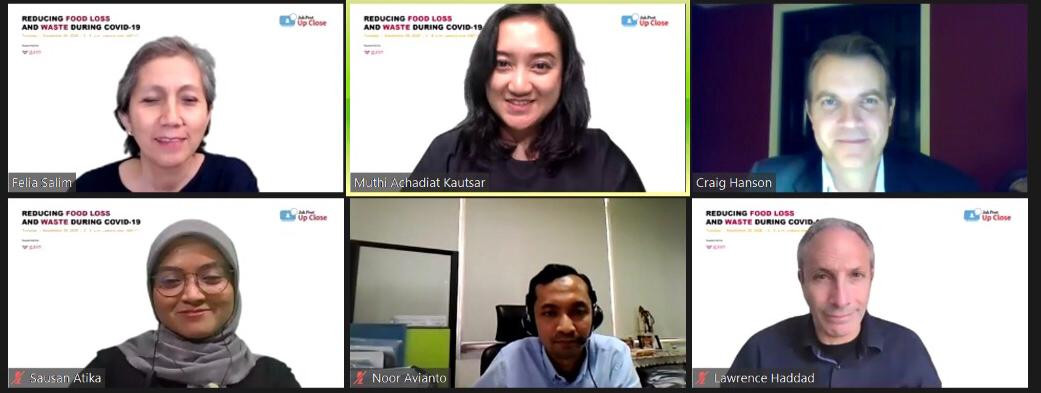Popular Reads
Top Results
Can't find what you're looking for?
View all search resultsPopular Reads
Top Results
Can't find what you're looking for?
View all search resultsTackling food loss, waste could benefit Indonesia on many fronts: Experts
Companies yield $14 in return for every $1 invested in reducing food loss and waste, including by measuring waste and changing packaging.
Change text size
Gift Premium Articles
to Anyone
 (Clockwise, from upper left) Food and Land Use (FOLU) ambassador Felia Salim, The Jakarta Post editor Muthi Kautsar, World Resources Institute (WRI) global director for food, forests and water Craig Hanson, Global Alliance for Improved Nutrition (GAIN) executive director Lawrence Haddad, National Planning Agency (Bappenas) deputy director for livestock development Noor Avianto and The Jakarta Post journalist Sausan Atika pose for a picture during a Jakpost Up Close webinar titled Reducing Food Loss and Waste During COVID-19 on Tuesday, Sept. 29, 2020. (JP/-)
(Clockwise, from upper left) Food and Land Use (FOLU) ambassador Felia Salim, The Jakarta Post editor Muthi Kautsar, World Resources Institute (WRI) global director for food, forests and water Craig Hanson, Global Alliance for Improved Nutrition (GAIN) executive director Lawrence Haddad, National Planning Agency (Bappenas) deputy director for livestock development Noor Avianto and The Jakarta Post journalist Sausan Atika pose for a picture during a Jakpost Up Close webinar titled Reducing Food Loss and Waste During COVID-19 on Tuesday, Sept. 29, 2020. (JP/-)
L
ocal and global organizations are urging Indonesia to reduce its food waste and loss to not only ensure the availability of nutritious food but also to prevent environmental degradation and financially benefit individuals and businesses.
World Resources Institute (WRI) global director for food, forests and water, Craig Hanson, said companies yielded $14 in return for every $1 invested in reducing food loss and waste, including by measuring waste and changing packaging.
To tackle the problem, Hanson cited a coalition of executives called "Champions 12.3" that had called on nations to integrate food loss and waste reduction into climate strategies, pursue the problems as part of COVID-19 responses and follow the “Target-Measure-Act” approach, as quoted by a recommendation paper published on Sept. 24.
“Now is the time to really take food loss and waste seriously,” Hanson said in a webinar organized by The Jakarta Post and the Global Alliance for Improved Nutrition (GAIN) in conjunction with the International Day of Awareness of Food Loss and Waste on Sept. 29.
Indonesia wastes about 300 kilograms of food per person every year, making it among the largest food wasters in the world, Economist Intelligence Unit (EIU) data revealed.
GAIN executive director Lawrence Haddad said in Tuesday's webinar that food loss was equivalent to nutrition loss and environment loss. Most high nutrients are highly perishable, and the availability of nutritious food is crucial in Indonesia, where high rates of undernutrition and overweight prevail.
The 2018 Basic Health Survey showed that one in three toddlers experienced stunting and nearly half of pregnant Indonesian women suffered from anemia due to micronutrient deficiencies during the same year. COVID-19 is exacerbating the stunting problem as it reduces food accessibility and affordability for households, degrading overall nutrient intake, according to Health Ministry findings.
GAIN is currently rolling out its I-PLAN program, which focuses on improving fish availability by reducing postharvest food losses. It involves assisting small and medium enterprises (SMEs), giving cash prizes to innovators that could create innovations to tackle the problem and creating demand by educating fish postharvest loss actors, among other measures.
“It’s a really strong incentive for businesses to not waste so much of the food and the products that they spend so long trying to grow, harvest and capture. So we have to help businesses to do that,” Haddad said.
Businesses are not alone in reaping benefits. Health Ministry public health nutrition director Dhian Dipo called reducing food waste an “investment” because reducing household expenditure through food waste reduction frees up resources for other household needs, such as education and health needs.
She said the government was addressing nutritional problems through a 2017 presidential decree on food and nutrition strategic policies that highlights nutrition education and community empowerment as among key strategies to tackle the problem.
Food and Land Use Coalition (FOLU) ambassador Felia Salim also quoted various studies showing that Indonesia could reduce up to 1.6 percent of greenhouse gas emissions relative to its emissions in 2013 by reducing 50 percent of rice, palm oil and dairy lost and wasted in the supply chain.
She said the greenhouse gas reduction was equal to taking 96 percent of Jakarta’s 5.3 million cars off the road.
“But how realistic is that [taking cars off Jakarta's roads]? It’s not realistic. The more realistic approach is tackling all these agro-based industries,” Felia said in the webinar.
Reducing the same amount of dairy waste and loss also allows Indonesia to stop 3 to 11 percent of dairy imports and save US$8 million to $30 million, which is equal to up to 30 times the annual budget of the Jakarta administration, she said. Rice waste and loss reduction also showed similar results.
Similarly, National Development Planning Agency (Bappenas) head of food, agriculture and livestock, Noor Avianto, said that managing food waste was among the agency's strategies to improve national food systems and governance under the country’s latest five-year plan (RPJMN).
Among other measures, the government has relaxed procurement standards for perishable products, incentivized food redistribution through tax reductions and imposed marketing restrictions for portions and packaging to reduce food loss and waste, he said.
“The important thing about the food waste [problem] is how we can increase the availability, accessibility and quality of food and on another side, [it is about how] we can reduce food waste at the community level,” he explained.
Globally, one-third of all food is lost or wasted each year, costing the global economy US$940 billion each year, according to data quoted by the WRI.









